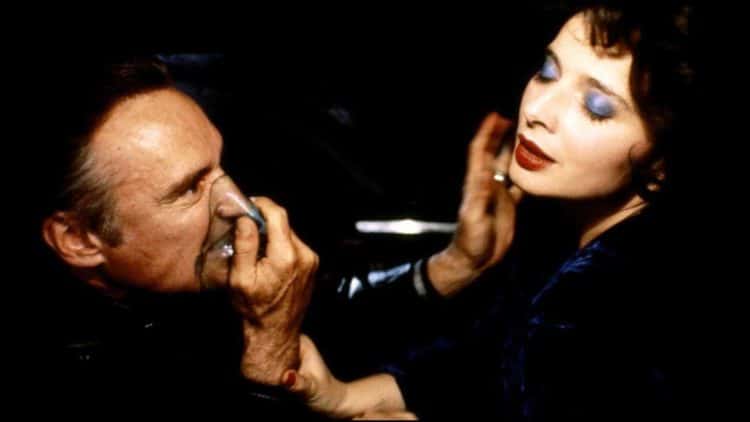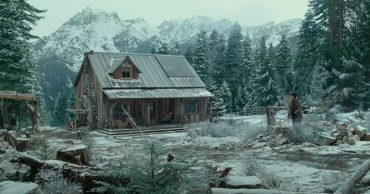
David Lynch has had a remarkable career as a filmmaker. Lynch has never won any Academy Awards; however, a golden statue doesn’t determine whether you’re a good filmmaker or not. Lynch gained notoriety thanks to Eraserhead, a movie about Henry, whose life changes drastically when a little fling with Mary X results in a baby, he marries the expectant mother and has her move in with him. One of the strange events sees their baby turn out to be a bizarre lizard-like creature, which happens to be the least of Henry’s troubles. The experimental horror film put Lynch on the map as a unique director; however, Blue Velvet is the film that helped solidify him as one of the best directors in Tinseltown. The 1986 feature stars Kyle MacLachlan as Jeffrey Beaumont following the news of his father’s stroke. The college student happens to discover a severed ear in an abandoned field, and Beaumont opts to take manners into his own hands to solve the mystery. They start off with a gorgeous lounge singer and Beaumont gets drawn deeper into a dark and twisted world where he encounters psychopath Frank Booth. While Lynch has gone on to make several other great films, these two greatly stick out the director’s filmography. So, which one is better? Let’s dive deeper into both Eraserhead and Blue Velvet.
Eraserhead
On the surface, Eraserhead needs multiple viewings to truly understand the message of the film. In fact, Eraserhead is the perfect definition of what an arthouse film is. However, Lynch always has a message when it comes to his films and the overall theme of fatherhood, and the struggles of parenting still shine through despite the absurdity of the situation. One of the issues of Eraserhead is that Lynch never explains the strange events that occur within the film. We don’t know how two humans managed to birth a lizard-like baby. Hell, there’s a scene with Henry, Mary, and the parents where a chicken comes alive and barely anyone bats an eyelash. When you think experimental films, Eraserhead is the perfect example. However, the flaws of Eraserhead are also the movie’s greatest strength. Lynch doesn’t get lost in the strange madness within the movie. The fact that Lynch doesn’t hold the audience’s hand is a rarity in cinema where most filmmakers feel that they need to explain nearly everything we’re seeing. Once you look back through Eraserhead, you’ll notice a lot of easter eggs that will help you understand the world and characters of the 1977 classic. Of course, the film is visually striking and one of the reasons that Eraserhead doesn’t fall apart is due to the grounded performance of Jack Nance. Given the circumstances of everything that’s going on, Nance’s actions are never over-the-top, and he perfectly displays a tortured soul trying to get his life together. Now, one of the most popular theories about Eraserhead is that the film is about fear, with may believing the lizard-like baby representing that exact theme. Whether that’s true of not, Eraserhead leaves you talking once the credits roll, and more importantly, fascinated about the mind of David Lynch.
Blue Velvet
The Neo-noir feature is more mainstream of the two films; however, it’s still in the style of David Lynch. What makes Blue Velvet pop isn’t just the beautiful cinematography, or the compelling story, but the cast of unique characters. Notably, the one man that stands out is Frank Booth, a violent and sexual deviant who has an unhealthy obsession with the word f**ker. Blue Velvet says a lot about the villain without saying much. This is where Lynch’s lack of explanation help heightens the world of Blue Velvet. Frank is an unpredictable being with a softer side, with him being nearly on the verge of tears as Dorothy Valens sings the blue velvet tune, leaving many intriguing questions unanswered. Not surprisingly, the late Dennis Hopper is simply tremendous here. The actor is able to balance the over-the-top sequences with a performance that still manages to stay away from being cartoonish. The central story of Blue Velvet remains engrossing. All the twists and turns are well executed and it’s extremely fascinating how much of a dark hole that Jeffrey dives into as the feature progresses. Speaking of which, Kyle MacLachlan is perfect for the lead role. Granted, the characters surrounding him are more compelling than Jeffrey; however, that’s really the point of his journey. He’s diving into the criminal underbelly with all sorts of different characters and because of that, Jeffrey stands out in the cast of corrupt people. Blue Velvet stands out as one of Lynch’s best works because it doesn’t try to be pretentious or overly complex, yet the simple story is weaved into a strong narrative.
So which feature is better? Blue Velvet, as previously stated, the David Lynch classic manages to mix the appeal of mainstream features, yet still has the inner workings of an arthouse feature.Eraserhead
 Follow Us
Follow Us





